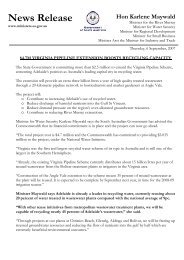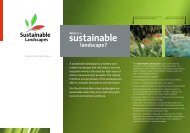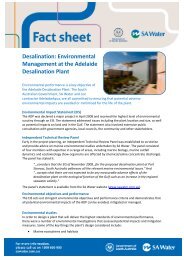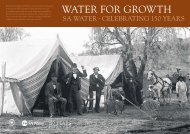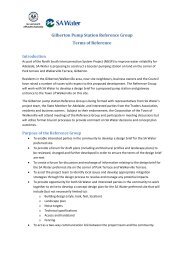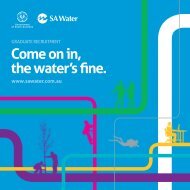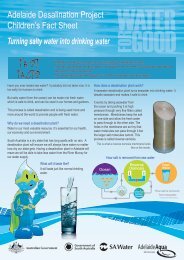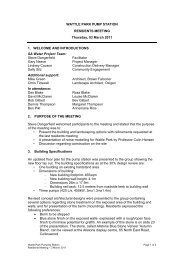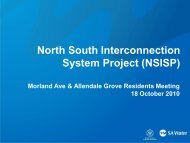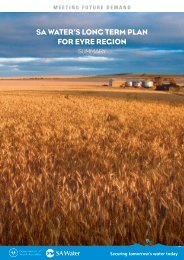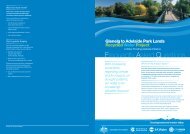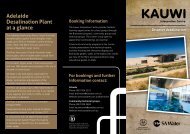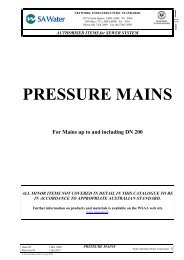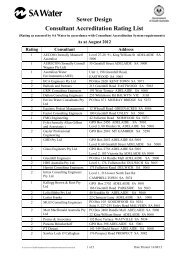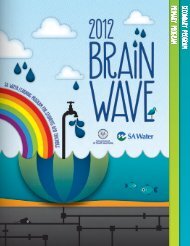Code of Practice - Irrigated Public Open Space - SA Water
Code of Practice - Irrigated Public Open Space - SA Water
Code of Practice - Irrigated Public Open Space - SA Water
Create successful ePaper yourself
Turn your PDF publications into a flip-book with our unique Google optimized e-Paper software.
Auditing <strong>of</strong> Existing Systems<br />
Auditing <strong>of</strong> all Council’s irrigation systems is prioritised,<br />
starting with high water use reserves and larger irrigated<br />
areas. Auditing <strong>of</strong> irrigation systems is an essential and<br />
valuable tool to understand system performance and<br />
develop the appropriate schedule for each site. The majority<br />
<strong>of</strong> irrigation system infrastructure is aging (10-30 years old)<br />
and was not designed to current industry ‘best practice’<br />
standards, resulting in high maintenance and poor system<br />
efficiency (Distribution uniformities averaging 55%).<br />
Irrigation System Upgrades/Subsurface Drip Irrigation<br />
Based on the results <strong>of</strong> the irrigation audits, irrigation<br />
systems are being progressively upgraded. Where appropriate,<br />
sub surface drip irrigation systems are being installed.<br />
The City <strong>of</strong> Tea Tree Gully was the first council in Australia<br />
to trial sub-surface drip irrigation in a sportsfield in 1993.<br />
Sub-surface drip irrigates the turf directly to the root zone<br />
where the water is required. These systems are capable <strong>of</strong><br />
improving irrigation efficiency by 30 – 40%. Vandalism and<br />
maintenance costs are also significantly reduced. Council<br />
has four sports fields and ten neighbourhood parks irrigated<br />
with sub-surface drip.<br />
Council has been successful in obtaining Federal<br />
Government Community <strong>Water</strong> Grant funding to assist in<br />
the upgrading <strong>of</strong> irrigation systems.<br />
Alternative <strong>Water</strong> Sources<br />
Council has been proactive over the last five years, and has<br />
put in place schemes to reduce reliance on mains water.<br />
These strategies have provided for diversion from mains<br />
water to reclaimed/reuse water and to date have accounted<br />
for approximately 90,000 kL per annum, equating to<br />
approximately 15% <strong>of</strong> the City’s water consumption.<br />
Tea Tree Gully Council has joined forces with the Cities <strong>of</strong><br />
Salisbury and Playford in the <strong>Water</strong>pro<strong>of</strong>ing Northern<br />
Adelaide initiative in a bid to conserve and recycle water in<br />
the northern suburbs <strong>of</strong> Adelaide. This new water resource<br />
management scheme will deliver significant social,<br />
environmental and economic developments to the City.<br />
Under this scheme the City, for irrigation proposes to totally<br />
replace the demand on mains water by using treated<br />
wastewater and cleansed stormwater to meet the Council’s<br />
irrigation needs and to supplement mains water supplied to<br />
industries with higher water requirements.<br />
APPENDICES<br />
42<br />
Conclusion<br />
Over the past three to five years sound irrigation<br />
management strategies has resulted in significant reduction<br />
<strong>of</strong> water consumption for irrigated public open space within<br />
the City <strong>of</strong> Tea Tree Gully. Subsequent to reduced water<br />
consumption has been significant financial savings which<br />
will be ongoing and enable the funding <strong>of</strong> irrigation<br />
upgrades, the introduction <strong>of</strong> new technology and the<br />
development <strong>of</strong> alternative water supplies which will ensure<br />
a sustainable water supply into the future.<br />
FURTHER INFORMATION:<br />
Go to www.teatreegully.sa.gov.au



